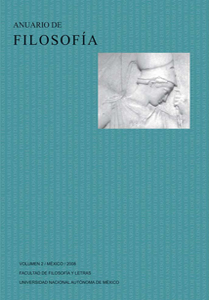Dialéctica clásica y método cartesiano
Main Article Content
Abstract
Too often it is supposed that Descartes tried to cut all links with the philosophical tradition, and that his main project was to develop a presupositionless philosophy. On the other hand, following the example set by Étienne Gilson great (and to a point, successful) efforts have been, and continue to be, devoted to clarify the many Scholastic debts that Descartes incurred in; and Cicero is another well-known influence on him. However and surprisingly, the possible classical Greek root of cartesianism (in particular that from Plato and Aristotle) has scarcely attracted the attention of the specialists. A brief exam shows that these links not only exist, but have to do with essential tenets and instruments of Descartes’ philosophy, like the doctrine of method. Therefore, it might well be necessary to take the (heretofore ignored) classical context of Descartes’ philosophy, as determinant to any reasonable interpretation of the latter. In fact, Descartes shouldn’t be seen only as a great philosopher by himself, as well as the founder of Modern Philosophy. He deserves to be taken as a Renaissance thinker--perhaps the last and the greatest of the humanists.
Article Details
How to Cite
de Teresa, J. M. (2012). Dialéctica clásica y método cartesiano. Anuario De Filosofía, 2. Retrieved from https://journals.unam.mx/index.php/afil/article/view/31540
